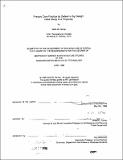Primary care practices by default or by design : case study of a physician
Author(s)
Harrop, Verlé M. (Verlé Margaret), 1952-
DownloadFull printable version (6.127Mb)
Advisor
William J. Porter.
Terms of use
Metadata
Show full item recordAbstract
Dr. Meaford, a prominent internist in a PMO ambulatory unit says that he is overwhelmed by his medical practice. He attributes the state of being overwhelmed to the fact that he is unable to implement systems of support for his practice that he has designed. The thesis starts with an overview of the systems of support in Dr. Meaford's primary care practice. In doing so identifiable default practice patterns emerged. In the process of fleshing out a context for those patterns it became apparent that organizational policy can either stress or support medical practice. In Terence Meaford's case it was very much the former. What constituted a practice-specific, workflow-based system of support for him did not constitute a support priority for the organization. This is essentially why his implementations of support for his practice failed. In the process of coming to this realisation, it seemed obvious to ask how much more successful a system implementation might be if it were coming from "the top down". To that end we looked at what might transpire when the PMO attempts to implement its system of support, the integrated electronic medical record system. It soon became obvious that there was a profound conflict of frames of reference: ABMII supports primary care practice: Meta Systems supports managed care business. The only place where the two frames of reference intersect is efficiency. If Terence can improve the efficiency of his practice he won't be so overwhelmed: If the organization can improve his efficiency then he will be able to increase his panel size and generate more revenue. The implementation of these electronic medical record systems signals the end of an era in healthcare: Meta Systems confirms the supremacy of organizational values right down to the essence of medical practice itself the physician-patient encounter. Jane Jacobs, in her 1992 book, "Systems of Survival A Dialogue on the Moral Foundations of Commerce and Politics", lays out 2 value systems: the guardian syndrome (Dr. Terence Meaford) and the commercial syndrome (Health right Plus the PMO). Her point is that the espoused self interests of these two groups will always be in conflict because their value systems are antithetical. In her analysis however, there is no mention of the role that technology plays in wrestling these two to the mat. I propose that technology could be the "zipper" that pulls these two sides together and that input at every level to the policy governing this technology is absolutely essential if quality of care is to remain a priority for the practice of medicine.
Description
Thesis (M.S.)--Massachusetts Institute of Technology, Dept. of Architecture, 1998. Includes bibliographical references (leaves 83-84).
Date issued
1998Department
Massachusetts Institute of Technology. Department of ArchitecturePublisher
Massachusetts Institute of Technology
Keywords
Architecture